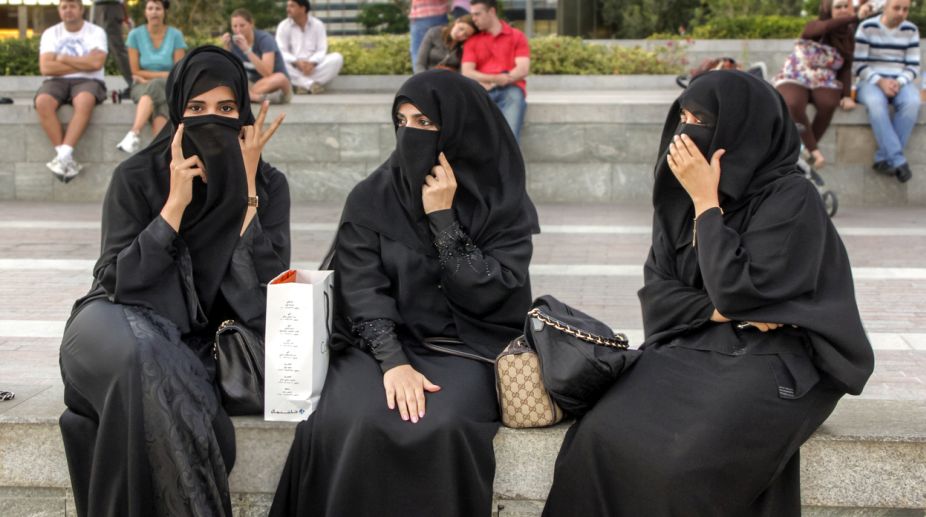US Supreme Court upholds ban on TikTok
The US Supreme Court on Friday upheld a law that bans TikTok, the video sharing App, from Sunday unless it is sold by its Chinese parent company.

Representational image (Photo: Getty)
To deter the practice of triple talaq, the All India Muslim Personal Law Board (AIMPLB) is all set to introduce a new provision in its model nikahnama in which the man has to commit that he will not give triple talaq (instant dovorce), a spokesman of the Board said here.
The development comes at a time when the government is making a strong pitch for the passage of bill that criminalises triple talaq, a Muslim way of divorce which is still in practice despite the Supreme Court striking it down in August last year, in the ongoing Budget Session of Parliament.
Advertisement
The AIMPLB has maintained that it against the practice of triple talaq, but it has opposed the proposed legislation saying it is an interference in Muslim personal law. The Board has, however, faced criticism for failing to bring reforms in personal laws.
Advertisement
“Yes… we are making a provision in the model nikahnama (Islamic marriage contract) in which there will be column – ‘I will not give triple talaq’. Once during nikah (marriage) this column is ticked, one will not be able to give triple talaq,” AIMPLB spokesman Maulana Khalil-ur-Rehman Sajjad Nomani told PTI here.
He said that a detailed discussion on the matter will be held at AIMPLB meeting in Hyderabad from February 9.
Besides other social issues, the two-day annual general meeting of the Board is likely to deliberate on developments in the Ram Janmabhoomi-Babri Masjid case.
The Board is also likely to finalise its roadmap for the coming year.
“In this meeting, the campaign being run against social evils such as triple talaq and dowry will be reviewed. The AIMPLB feels that without social awareness, no system in the country can succeed.
“The Board is running a big campaign in the country. The messengers of the Board will reach every madrassa and mosque and tell people to stay away from social evils like dowry and triple talaq,” he said.
A progress report will also be sought on the work done and based on this, a plan for the next year will be prepared, he said.
“Since, the cases of triple talaq happen generally among the less educated, the Board will work hard in rural areas. Students and teachers of madrassas will be included as messengers.
“Their main job will be to spread the message about evils of dowry and triple talaq. If the need for divorce arises, then one should first contact and consult a cleric and stay away from triple talaq,” Nomani said.
The spokesperson said that this campaign had gained momentum in the past one year.
Nomani said the board was also using various social media tools in this regard.
“The AIMPLB is strictly against triple talaq, but in some circumstances, triple talaq has been recognised. In many cases, the women themselves seek triple talaq.
“People, who are not involved with the (Muslim) society perceive that all the cases of triple talaq are committed by men. This is completely wrong,” Nomani said.
In August, the Supreme Court struck down the controversial Islamic practice of instant divorce or ‘talaq- e-biddat’ as arbitrary and unconstitutional. The government later brought the Muslim Women (Protection of Rights on Marriage) Bill which was passed by the Lok Sabha on December 28. It seeks to declare instant triple a criminal offence with a provision of up to three years in jail for the husband.
Political parties indulged in a slugfest both inside and outside Parliament when the bill was tabled last month in the Rajya Sabha, where the BJP-led NDA does not enjoy majority.
While the government wanted a debate on the bill in the Rajya Sabha, the opposition demanded that it be sent to a Select Committee for scrutiny before it is a made a law.
Parliamentary Affairs Minister Ananth Kumar has said that cooperation of all political parties has been sought to bring about consensus on the issue to ensure the passage of bill in the current session.
The RJD, AIMIM, BJD, AIADMK and All India Muslim League oppose the bill, calling it arbitrary in nature and a faulty proposal.
The Muslim Women (Protection of Rights on Marriage) Bill would only be applicable on instant triple talaq or ‘talaq-e- biddat’.
It gives power to the victim to approach a magistrate seeking “subsistence allowance” for herself and minor children. A victim can also seek the custody of her minor children from the magistrate.
Under the proposed law, instant triple talaq in any form — spoken, in writing or by electronic means such as email, SMS and WhatsApp — would be illegal and void.
Advertisement